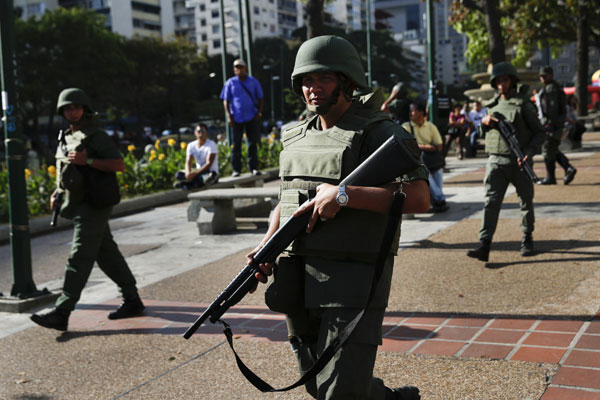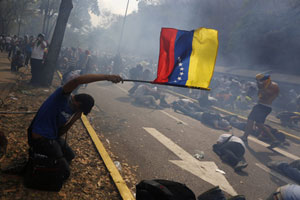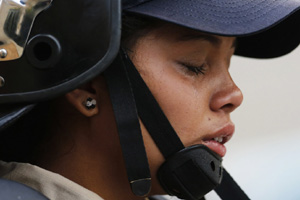 |
| National Guards patrol at Altamira square in Caracas March 17, 2014. [Photo/Agencies] |
COURT ORDERS BARRICADES DOWN
On Monday, the Supreme Court ordered the opposition mayors of four municipalities to remove street barricades set up by demonstrators. It issued a similar order against two opposition-run municipalities in eastern Caracas last week.
It also summoned the opposition mayor of a municipality in central Carabobo state to explain his "presumed failure" to comply with another order to remove barriers from roads.
The opposition Popular Will party said it was planning a march in Caracas on Tuesday to mark a month since its hardline leader, Leopoldo Lopez, handed himself in to face charges of fomenting unrest after helping kick off the demonstrations.
The protesters are far fewer than those who took to the streets a decade ago to oust Chavez, albeit briefly. Opposition leaders are deeply divided over the current confrontations.
During the daytime, thousands of opposition supporters have marched peacefully. Then a masked hard core has been emerging in the evenings, especially in wealthier eastern Caracas, to fight running battles with riot police and the National Guard.
Supporters of both political camps, and several members of the security forces, have been killed. Hundreds of people have been injured, and more than 1,500 have been arrested.
About 100 people remain behind bars, including 21 security officials accused of crimes ranging from brutality to homicide.
Air Canada said on Monday it was suspending flights to Caracas until further notice because of the unrest, saying it could not ensure the safety of its operation.
In the capital on Sunday, troops cleared demonstrators from Plaza Altamira, a square in the wealthy east of the capital that became the wreckage-strewn site of daily violent clashes.
National Guard soldiers posted around the plaza said they had seized home-made shields, materials for Molotov cocktails, and medicines used by the protesters to counteract tear gas.
Late on Monday, hundreds of protesters demonstrated peacefully in the square - in sharp contrast to previous nights' confrontations - singing and waving flags as police looked on.
Cenaida Pavon, a 40-year-old secretary walking through the square, said she supported the demonstrators' right to protest peacefully but not the destruction of property.
"They hate what President Chavez left behind," she said, adding that the nearby school her 8-year-old son went to had been closed since the start of the demonstrations.
"That's terrorism, not protest," Pavon said.
 |
 |